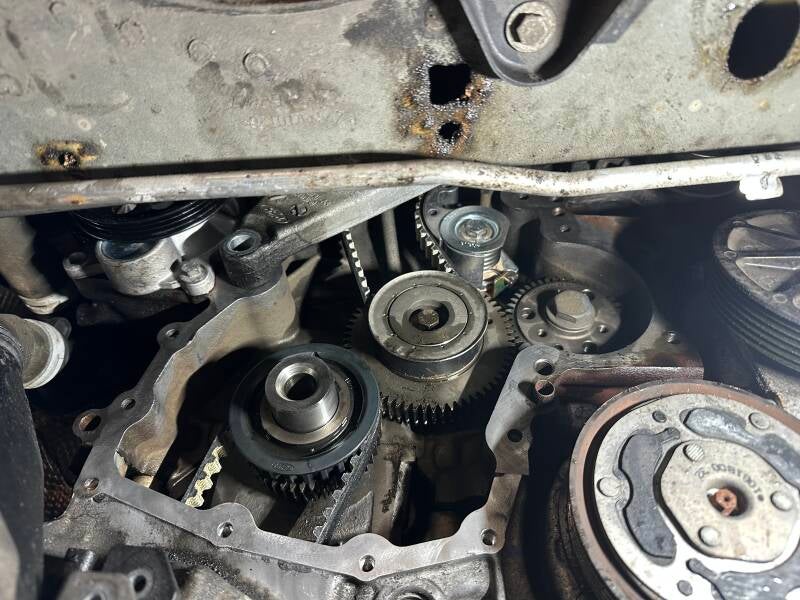
If you drive a Ford Transit or manage a fleet of them, there’s one issue you can’t afford to ignore: the wet belt. Also known as an oil-lubricated timing belt, this component is found in the 2.0L EcoBlue diesel engine used in many Transits from 2016 onwards. While designed for quiet operation and improved fuel efficiency, the wet belt system has become a common cause of serious engine damage and unexpected repair bills.
What Is a Wet Belt?
A wet belt is a timing belt that runs inside the engine, constantly bathed in engine oil. It was introduced to reduce friction, lower noise, and extend service intervals. But in practice, many Transit owners have found the system to be far less reliable than expected.
Common Problems with Wet Belts
In theory, wet belts are supposed to last up to 150,000 miles or 10 years. In reality, we’re seeing Ford Transits suffer from belt failure much earlier—sometimes in as little as 60,000 miles or 3–4 years. The most common problems include:
- Premature belt degradation
- Shredding or missing teeth
- Oil contamination and sludge buildup
- Catastrophic engine failure if the belt breaks
These failures often come with little warning, and because the wet belt is hidden inside the engine, it’s not easy to inspect without the right tools or knowledge.
Real Cases We See at TGPP-Autocare
At TGPP-Autocare Stevenage, we’ve seen Transit vans with wet belt failures that have destroyed entire engines. One local business brought us a Transit Custom with under 70,000 miles. The wet belt had started disintegrating, clogging the oil pickup and starving the engine of lubrication. The result? A full engine replacement.
Transparent, fixed pricing for Ford Transit wet belt replacement.

Why Did Ford Use Wet Belts?
Ford introduced wet belts for modern emissions standards and improved engine performance. Wet belts are lighter and quieter, helping boost fuel economy. But the trade-off is that they’re more vulnerable to oil quality and servicing intervals. If you miss just one oil change, the risk of belt damage goes up dramatically.
Signs Your Wet Belt Might Be Failing
Don’t wait until it’s too late. Here are some early warning signs your wet belt may be deteriorating:
- Ticking or whining noises from the engine
- Difficulty starting or poor performance
- Oil pressure warning lights
- Engine misfires or rough idle
- Oil looking unusually thick or contaminated
If you notice any of these, book an inspection immediately. The cost of a proactive wet belt replacement is a fraction of what a new engine will set you back.
Worried about symptoms? Let us take a look before it gets worse.
What Happens If the Wet Belt Breaks?
A snapped wet belt can lead to:
- Complete loss of timing
- Valve and piston collisions
- Blocked oil passageways
- Engine seizure or failure
The damage is often irreversible, and in most cases, the only fix is a full engine rebuild or replacement.
How to Protect Your Ford Transit
- Have the belt inspected regularly—especially after 60,000 miles.
- Stick to strict oil service intervals using the correct spec oil.
- Replace the wet belt early—don’t wait for failure.
- Use a garage experienced with EcoBlue engines, like TGPP-Autocare Stevenage.
Book a service to avoid costly repairs later
Book Your Wet Belt Inspection in Stevenage
If you own a Ford Transit, especially one built after 2016 with a 2.0L EcoBlue engine, book a wet belt inspection with TGPP-Autocare. We specialise in timing belt replacements and engine care for commercial vehicles and have helped dozens of local business owners avoid costly downtime.
Quick appointments. Trusted local garage in Stevenage
Call or message our team for personalised advice




Add comment
Comments
OVER THE LAST FEW MONTHS WE HAVE HAD TWO GO, BOTH ON AROUND 51,000, IS THEIR ANY COME BACK ON FORD FOR USING FAULTY PARTS OR PARTS UNFIT FOR PURPOSE ?
We have seen failures at 50,000 to 60,000 miles. You are not alone. But Ford’s official position is that belt degradation is influenced by maintenance, not a defective part.
In rare cases, some owners have had partial goodwill. This is usually when:
• The van has full service history.
• Oil changes were done early, not late.
• The vehicle is only just out of warranty.
You say have the belt inspected regularly but is there a way of doing this easily?
How much is a wet belt change